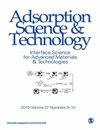磁性氮掺杂氧化石墨烯纳米复合材料去除活性橙12染料的合成
IF 2.8
4区 工程技术
Q2 CHEMISTRY, APPLIED
引用次数: 10
摘要
本文报道了用氮掺杂氧化石墨烯(N-GO)制备磁性铁氧体钙(CaFe2O4)的纳米复合材料,并通过超声波法制备了CaFe2O4/N-GO纳米复合材料,用于去除水溶液中的活性橙12 (RO12)染料。通过扫描电子显微镜(SEM)、透射电子显微镜(TEM)、傅里叶变换红外光谱(FT-IR)和x射线衍射(XRD)等不同的表征技术,证实了纳米复合材料的成功构建。利用振动样品磁强计(VSM)研究了合成材料的磁性能,表明吸附处理后的合成材料在外加磁场作用下的铁磁行为有利于其分离。N-GO的加入使CaFe2O4纳米颗粒的BET比表面积从24增加到52.93 m2/g,这是N2吸附-脱附等温线的结果。合成的纳米材料的吸附受染料初始浓度、接触时间、吸附剂用量和pH等参数的控制,动力学研究表明,CaFe2O4纳米颗粒和CaFe2O4/N-GO纳米复合材料表面的RO12染料通过化学吸附过程去除。吸附等温线研究表明,Langmuir等温线最能描述RO12染料的吸附过程,支持单层吸附。根据Langmuir模型,CaFe2O4纳米颗粒和CaFe2O4/N-GO纳米复合材料对RO12的最大吸附量分别为250 mg/g和333.33 mg/g。CaFe2O4/N-GO纳米复合材料提供的吸附容量高于文献报道的吸附剂材料。此外,再生研究表明,CaFe2O4/N-GO纳米复合材料是一种可重复使用的低成本吸附剂。因此,纳米CaFe2O4/N-GO杂化材料是一种很有前途的水处理吸附剂。本文章由计算机程序翻译,如有差异,请以英文原文为准。
The Synthesis of Magnetic Nitrogen-Doped Graphene Oxide Nanocomposite for the Removal of Reactive Orange 12 Dye
Herein, we report the nanofabrication of magnetic calcium ferrite (CaFe2O4) with nitrogen-doped graphene oxide (N-GO) via facile ultrasonication method to produce CaFe2O4/N-GO nanocomposite for the potential removal of reactive orange 12 (RO12) dye from aqueous solution. The successful construction of the nanocomposite was confirmed using different characterization techniques including scanning electron microscopy (SEM), transmission electron microscopy (TEM), Fourier transform-infrared spectroscopy (FT-IR), and X-ray diffraction (XRD). The magnetic properties were studied using vibrating sample magnetometer (VSM) indicating ferromagnetic behavior of the synthesized materials that facilitate their separation using an external magnetic field after adsorption treatment. The addition of N-GO to CaFe2O4 nanoparticles enhanced the BET surface area from 24 to 52.93 m2/g as resulted from the N2 adsorption-desorption isotherm. The adsorption of the synthesized nanomaterials is controlled by several parameters (initial concentration of dye, contact time, adsorbent dosage, and pH), and the RO12 dye removal on the surface of CaFe2O4 nanoparticles and CaFe2O4/N-GO nanocomposite was reached through the chemisorption process as indicated from the kinetic study. The adsorption isotherm study indicated that the adsorption process of RO12 dye was best described through the Langmuir isotherm approving the monolayer adsorption. According to the Langmuir model, the maximum adsorption capacity for RO12 was 250 and 333.33 mg/g for CaFe2O4 nanoparticles and CaFe2O4/N-GO nanocomposite, respectively. The adsorption capacity offered by CaFe2O4/N-GO nanocomposite was higher than reported in the literature for adsorbent materials. Additionally, the regeneration study indicated that CaFe2O4/N-GO nanocomposite is reusable and cost-effective adsorbent. Therefore, the nanofabricated CaFe2O4/N-GO hybrid material is a promising adsorbent for water treatment.
求助全文
通过发布文献求助,成功后即可免费获取论文全文。
去求助
来源期刊

Adsorption Science & Technology
工程技术-工程:化工
CiteScore
5.00
自引率
10.30%
发文量
181
审稿时长
4.5 months
期刊介绍:
Adsorption Science & Technology is a peer-reviewed, open access journal devoted to studies of adsorption and desorption phenomena, which publishes original research papers and critical review articles, with occasional special issues relating to particular topics and symposia.
 求助内容:
求助内容: 应助结果提醒方式:
应助结果提醒方式:


